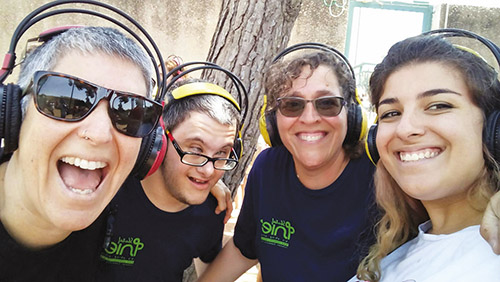

New York native Beth Steinberg was living an unassuming life as a Jerusalem immigrant and parent of a child with special needs. Some of her greatest challenges arose each summer when she would struggle to find activities for her son Akiva in the absence of an appropriate framework for children or teens with special needs. It was in the summer of 2007 when Steinberg, along with three other women in the same situation, decided to take matters into their own hands and create a solution.
That summer, the group of women ran a two-week camp in Jerusalem for their children, along with friends with and without special needs. The 10 campers had a blast, and the next year the women ran another camp, this time for 50 kids. Steinberg and one of the mothers, Miriam Avraham, looked at the smiles on their children’s faces and said that if they would offer inclusive programming in Jerusalem, people would come.
Indeed, the 10-person camp in 2007 turned into the Shutaf Inclusion Program in Jerusalem, co-founded by Steinberg and Avraham, offering year-round activities for nearly 300 children, teens and young adults between the ages of 6-30, with and without special needs.
The notion of inclusion is still fairly new in Israel. Most children with special needs study in separate schools or classes, while normative children do not generally meet or interact with children with special needs. Shutaf challenged preconceived notions about disabilities and placed inclusion as its guiding ethos. In addition to providing programming to individuals with and without disabilities, Shutaf also runs educational workshops and produces resources concerning inclusion of all members of the community.
The highlight of the year-round programming is a three-week summer camp in Jerusalem. “Camp Shutaf” is a special place that is the essence of acceptance. The camp ratio is 75% campers with special needs and 25% typical children and teens. The staff as well is mixed. Steinberg is convinced that when kids are having fun, they don’t see the differences between those with and without disabilities.
Steinberg speaks with great passion when describing a typical day at camp. Each morning begins with a large circle where counselors lead the campers in song and dance. Typical activities such as music, drama, lacrosse, archery, arts and crafts, science and soccer fill the day. Every activity is planned in detail to fit the needs of each camper and make them feel welcomed. All campers, whether or not they have disabilities, receive a home visit during the summer by a Shutaf staff member. These visits help the staff better understand each camper’s needs and address them.
Steinberg stresses that at Shutaf, there is a place for each and every individual. Many of the campers are children or teens who fall between the cracks, including high-risk youth from broken homes who are not accepted elsewhere. The dedicated staff will fight for each and every camper, regardless of his or her background or ability level. And when a very challenging camper comes along, the staff works together to build an individualized program for him or her.
One of the greatest challenges Steinberg faces is lack of funding. To date, Shutaf has not received any government aid for its programs. Without this guaranteed source of income, Shutaf must rely solely on philanthropic giving from donors in Israel and abroad. There were summers when Steinberg and Avraham thought they would not be able to run the camp, but in the end they have always been able to pull through.
Steinberg views Shutaf as much more than a summer camp or after-school program, but as a principle that is still lacking in Israel. “Inclusion is what you do every day. It’s about when you walk into the world and engage with people who may be different from you. It’s about when you go to the grocery store and the cashier is slow and you say, ‘Maybe I can take a deep breath and just move along with it’.” Thinking of the future, she envisions a society that is more accepting of others with differences—and less afraid to talk about disability.
Much has changed since the summer of 2007. Steinberg’s son Akiva has since aged out of camp. Today he is an active participant in the Shutaf programming for young adults. He as well as hundreds of other young Israelis with and without special needs have learned from one another and formed lasting social connections. Ultimately, the summer camp that started 14 years ago as a solution for a group of mothers became one of Israel’s greatest models for an inclusive society.
Alisa Bodner is a Fair Lawn native who immigrated to Israel a decade ago. She is a nonprofit management professional who enjoys writing in her free time.
For more information on Shutaf visit www.campshutaf.org









